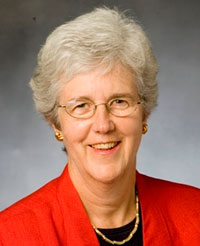|
Helen (Sunny) Ladd — is a member of CALDER's Management Team and leads the North Carolina effort. She is the Edgar Thompson Professor of Public Policy Studies in the Sanford Institute of Public Policy Studies and Professor of Economics at Duke University. |
In general, are teachers and principals in high-poverty schools of the same quality as teachers and principals in schools serving more advantaged kids?
No, on average they are not. This conclusion is based on our CALDER Center research in which we focus on teacher "qualifications" or "credentials." A broader concept of teacher "quality" is difficult to measure since it's partly of matter of personality.
Our research focuses on teachers in grades K through 12, and we examine a variety of teacher credentials. For example, we look at teachers' years of experience, the type of license they have, their licensure test scores, whether the National Board for Professional Teaching Standards has certified them, and whether they have masters degrees.
No matter which credential we use, we find that schools serving the most students in poverty have teachers with lower average credentials. Such schools have the highest percentages of teachers with less than three years of teaching experience, with non-standard licensing, and with undergraduate degrees from non-competitive colleges. High-poverty schools also tend to have teachers with the lowest average teacher test scores and the lowest percentage of teachers with national board certification.
So to answer your question once again, the schools serving the most disadvantaged students have the highest concentrations of teachers with the weakest credentials. The biggest disparity in teacher credentials is between middle schools serving students with the highest concentrations of poor students and those serving the lowest.
The same distressing picture emerges with school principals at high-poverty schools. This finding is important because principals haven't been studied as much as teachers have.
How important is it to student achievement for teachers to have these credentials—classroom experience, high test scores, and proper licensing?
It's very important. Our research documents that teacher credentials have strong and systematic effects on student achievement.
And some credentials matter more than others. Teacher experience is especially important at the low end of the experience distribution. In other words, student achievement with a ten-year veteran won't be much different than with a teacher with eight or nine years of experience. But a teacher with one or two years of experience can be expected to make a much bigger difference than one with no experience. This is common sense, but now with longitudinal data we can document this pattern in a convincing manner. In North Carolina, we have documented it at the elementary level, and, more recently, at the high school level.
And I should note that in our statistical analysis, we took careful account of the fact that academically stronger students are often placed in classrooms with stronger teachers.
How important are teacher credentials relative to other factors that affect student performance?
Our research, based on an analysis of students in grades 3 through 5, shows that it's more important to have a teacher with good credentials than to be in a smaller class.
In addition, in terms of math achievement, teacher credentials can go a long way toward offsetting the educational disadvantage of a student who does not have well-educated parents. That's because with math, unlike reading, what goes on in the classroom typically matters a lot more than what goes on at home. A lot of parents read with their kids but fewer do fractions with them.
Does your research at this point give clear policy guidance?
Yes it does. Since we have found that teacher credentials vary across schools, any accountability system—whether it's No Child Left Behind or a state accountability system—needs to recognize that schools with teachers who have weaker qualifications are going to have a harder time meeting accountability requirements. That is not to excuse those schools, but rather highlights the need for policymakers to try to even out the distribution of teachers across schools.
Second, our research highlights that because teachers themselves have preferences, and many might prefer to work where students achieve at higher levels, policymakers can't just tell teachers where to teach. Instead they need to look for ways to provide incentives for the stronger teachers to work in the high-poverty schools.
Third, since our research has shown that experience is an important predictor of student achievement, especially among the newest teachers, we would support efforts to provide novice teachers with the support they need to get up to speed in the classroom and efforts to distribute novice teachers more evenly across schools within a district.
Fourth, in light of our finding that in grades 3 through 5, having a teacher with better credentials matters more for student achievement than having a smaller class size, policymakers may want to invest more resources in teacher quality and worry less about reducing the size of a class for those grades.
Finally, our finding that having a teacher with a master's degree at the elementary school level has no more positive effect on student achievement than having a teacher without one suggests that it may not be worthwhile to pay more for the holder of a master's degree at that level. But for high school teachers, the higher salary might be justified because we have found that student achievement is higher in classes where the teacher holds a master's degree.




